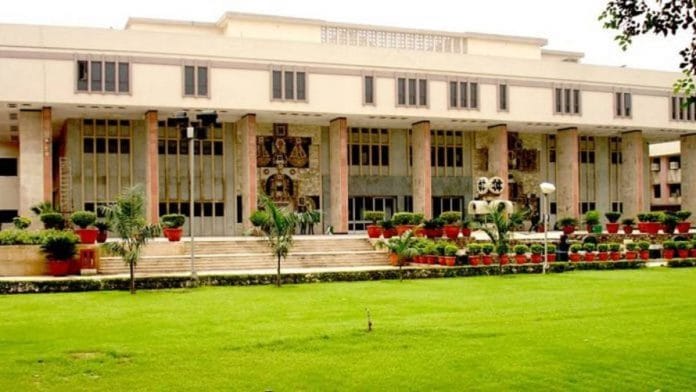New Delhi: In a significant ruling protecting the academic futures of two meritorious students, the Delhi High Court’s Division Bench refused to stay an earlier order that had directed the Indian government to grant them scholarships under the National Overseas Scholarship (NOS) Scheme.
The bench of Chief Justice D.K. Upadhyaya and Justice Tushar Rao Gedela ordered the government to “immediately grant” the benefits to ensure the students’ higher education abroad did not “take a backseat”, even as the Ministry of Social Justice & Empowerment (MoSJE) continues to challenge the judgment.
The Indian government, through the MoSJE, appealed against Justice Sachin Datta’s 25 September judgment, which had overturned the rejection of two students’ scholarship applications that were denied over a technical issue with their income certificates.
According to their website, the National Overseas Scholarship “aims to empower low-income students from marginalised communities, including the Scheduled Castes, Denotified Nomadic and Semi-Nomadic Tribes, Landless Agricultural Labourers, and Traditional Artisans”. It supports the students’ “pursuit of higher education” by “providing opportunities to study abroad, ultimately contributing to their economic and social upliftment”.
The dispute: Technicality vs merit
Manish Kumar, admitted to the MSc Computer Science programme at the University of Glasgow, and Vishal Kumar, admitted to the MSc Economics programme at the London School of Economics and Political Science (LSE), had applied for the NOS Scheme 2025–26. Their applications were rejected solely on the ground that the “Income Certificate of valid FY” (Financial Year) was “not furnished”. Both candidates were represented in court by Advocate Sushant Singh.
The Ministry insisted that as per Clause 8(c) of the NOS guidelines, candidates must submit an income certificate specifically for the Financial Year 2023–24 for the first round of selection.
Manish Kumar’s certificate, dated 8 December 2023, declared an income of Rs 96,000 but did not specify the relevant financial year. Since it was issued before the close of FY 2023–24, the Ministry considered it applicable to FY 2022–23.
Similarly, Vishal Kumar’s certificate, dated 21 April 2025, was deemed to correspond to FY 2024–25 rather than FY 2023–24.
The Ministry argued that accepting such documents would “undermine the integrity and fairness” of the competitive process, noting that 141 other applications were rejected on the same ground.
What was the single judge’s order?
Delhi HC’s Justice Sachin Datta’s order on September 25, 2025, took strong exception to the Ministry’s rigid approach, calling the rejection “wholly untenable” and “based on a minor technicality”.
The court emphasised that both students were substantively “eligible”, as their family incomes were well below the prescribed threshold of Rs 8 lakh per annum.
Crucially, the judge noted that income certificates issued by the Delhi Government are valid for six months but do not expressly indicate the financial year—a matter outside the applicants’ control. This administrative ambiguity, the court held, could not be used to penalise otherwise eligible candidates.
Regarding Manish Kumar, the court observed that his certificate, valid until mid-2024, “substantially complied” with the requirement. It further criticised the ministry for inconsistency, pointing out that it had later accepted a similar certificate from Vishal Kumar for a subsequent round.
The single judge thus directed the MoSJE to “immediately process the grant of the requisite scholarship” and complete all formalities so that both students could join their universities before the admission deadlines.
Beyond granting relief, Justice Datta also flagged a systemic flaw in the NOS process and directed the Government of NCT of Delhi (GNCTD) to “update its formats” so that income certificates expressly reflect the relevant financial year or period.
He underscored an “urgent need to streamline the process” to prevent such “undue hardship” for future applicants.
Centre’s grounds for appeal
In its appeal against the single judge order, filed in early October, a copy of which is with ThePrint, the Ministry of Social Justice & Empowerment contended that the single judge “failed to appreciate” that the students’ documents did not comply with mandatory eligibility criteria under Clause 8(c) of the NOS guidelines.
The Centre maintained that the income certificate is a core eligibility document, not a mere formality, and that relaxing this requirement would “undermine the uniform implementation” of the scheme.
It further argued that allowing exceptions could “discriminate against other similarly placed candidates” whose applications were rejected for the same reason. The ministry warned that such leniency would compromise the transparency and objectivity of the NOS selection process.
Division bench rejects Centre’s bid to delay
When the matter reached the Division Bench of the HC, the Centre sought an interim stay on the single judge’s order pending appeal. However, on 27 October, the Bench declined to halt the implementation.
While issuing notice only to consider the broader question of law, the Chief Justice categorically stated that the court would “refrain from staying the operation of the judgment under appeals”.
The Bench directed, “So that the higher studies of the respondent no.1 (student) do not take a backseat, we direct that the benefit arising out of the judgment under appeal shall be immediately granted to the said respondent.”
In essence, meaning that the Ministry must release the scholarship funds immediately, regardless of the ongoing litigation; underscoring the insistence that meritorious candidates should not suffer due to administrative lapses or procedural ambiguities.
(Edited by Viny Mishra)
Also read: Slide in govt school enrolments continued in 2024-25; UP alone witnessed drop of 21.82 lakh






